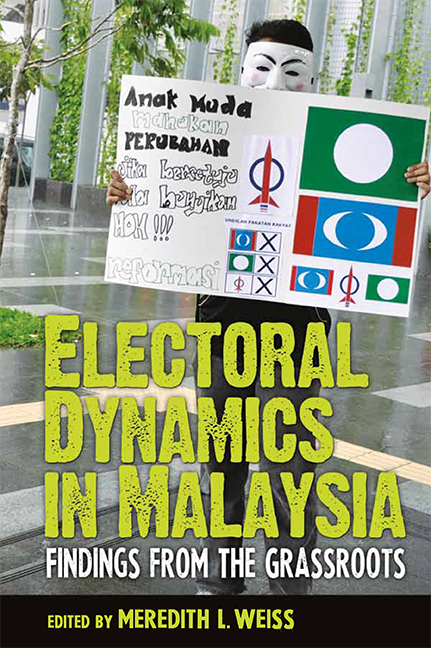Book contents
- Frontmatter
- Contents
- List of Tables
- Foreword
- Acknowledgements
- Glossary & Acronyms
- Chapter 1 Introduction: Patterns and Puzzles in Malaysian Electoral Dynamics
- Chapter 2 Arau, Perlis: The Irresistible Charm of Warlords, Women and Rewards?
- Chapter 3 Padang Serai, Kedah: Between the ‘Personal Touch’ and the Generous Hand
- Chapter 4 Kuala Nerus, Terengganu: New Malay Politics?
- Chapter 5 Balik Pulau, Penang: Home Run for the Home Boys
- Chapter 6 Lumut, Perak: Patronage, Clientelism and the Post-Coup Order
- Chapter 7 Kuantan, Pahang: Revealing the Ordinary
- Chapter 8 Pandan, Selangor: New Electoral Dynamics in Urban Malaysia
- Chapter 9 Kepong and Titiwangsa, Kuala Lumpur: Messages or Money?
- Chapter 10 Rembau, Negeri Sembilan: Personalities and Promises
- Chapter 11 Pulai, Johor: A Tale of Two Coalitions
- Chapter 12 Gelang Patah, Johor: Did Lim Kit Siang Truly Win His Last Gamble?
- Chapter 13 Kota Marudu and Keningau, Sabah: Personality, Patronage and Parochial Politics
- Chapter 14 Tuaran, Sabah: Party Loyalty and Rational Voting
- Chapter 15 Kota Kinabalu, Sabah: BN Loses Its ‘Fixed Deposit’
- Chapter 16 Beaufort, Sabah: Whither Lajim's Popularity?
- Chapter 17 Sibu and Lanang, Sarawak: Defeat of the Bosses
- Contributors
Chapter 11 - Pulai, Johor: A Tale of Two Coalitions
Published online by Cambridge University Press: 10 November 2017
- Frontmatter
- Contents
- List of Tables
- Foreword
- Acknowledgements
- Glossary & Acronyms
- Chapter 1 Introduction: Patterns and Puzzles in Malaysian Electoral Dynamics
- Chapter 2 Arau, Perlis: The Irresistible Charm of Warlords, Women and Rewards?
- Chapter 3 Padang Serai, Kedah: Between the ‘Personal Touch’ and the Generous Hand
- Chapter 4 Kuala Nerus, Terengganu: New Malay Politics?
- Chapter 5 Balik Pulau, Penang: Home Run for the Home Boys
- Chapter 6 Lumut, Perak: Patronage, Clientelism and the Post-Coup Order
- Chapter 7 Kuantan, Pahang: Revealing the Ordinary
- Chapter 8 Pandan, Selangor: New Electoral Dynamics in Urban Malaysia
- Chapter 9 Kepong and Titiwangsa, Kuala Lumpur: Messages or Money?
- Chapter 10 Rembau, Negeri Sembilan: Personalities and Promises
- Chapter 11 Pulai, Johor: A Tale of Two Coalitions
- Chapter 12 Gelang Patah, Johor: Did Lim Kit Siang Truly Win His Last Gamble?
- Chapter 13 Kota Marudu and Keningau, Sabah: Personality, Patronage and Parochial Politics
- Chapter 14 Tuaran, Sabah: Party Loyalty and Rational Voting
- Chapter 15 Kota Kinabalu, Sabah: BN Loses Its ‘Fixed Deposit’
- Chapter 16 Beaufort, Sabah: Whither Lajim's Popularity?
- Chapter 17 Sibu and Lanang, Sarawak: Defeat of the Bosses
- Contributors
Summary
Introduction
Pulai is an ethnically-mixed urban parliamentary seat in Johor consisting of the two smaller state seats of Pengkalan Rinting and Kempas. Despite its classification, Pulai also has a fair share of rural voters due to a number of Malay kampung (villages) that form part of its southern border. The Malays in Pulai slightly outnumber Chinese voters, though neither group comprises a majority of Pulai's 100,490 registered voters. A further breakdown of Pulai shows that the majority of the Chinese population reside within the more urbanised and well-to-do state seat of Pengkalan Rinting, whereas the Malays are split equally between the poorer urban state seat of Kempas and kampung in the southern corner of Pengkalan Rinting. The constituency not only includes medium- and high-wealth residences, but also many lowto medium-density residential zones with low wealth (specifically within Kempas and Malay kampung). This pattern has naturally led to a diverse occupational mix within the seat, ranging from fishermen to highly skilled professionals who commute daily to the city centre or across the border to Singapore. Moreover, Pulai is part of the Iskandar Economic Zone, a 2,217-square kilometre zone earmarked by the government for focused development. This diverse demography makes Pulai an intriguing case study. Furthermore, the constituency has a very interesting voting history.
Pulai was one of a number of urban parliamentary seats with a significant Chinese majority that remained staunchly with Barisan Nasional (BN) in the 2008 elections. Pulai thus provides an apt context in which to examine the effectiveness of money politics, defined here as the attempt to woo votes through handouts and particularistic promises across diverse population segments. Its experience suggests differences in the vulnerability to such lures of two distinct blocs of voters: the urban/rural Malay poor and the well-to-do urban Chinese.
Progress of the campaign
It was a hot and humid afternoon when I made my way into one of the local kedai kopi (coffee houses) in Kampung Pasir, a village in the southwest corner of the Pengkalan Rinting state seat, after searching for the DAP candidate who was said to be visiting.
- Type
- Chapter
- Information
- Electoral Dynamics in MalaysiaFindings from the Grassroots, pp. 153 - 166Publisher: ISEAS–Yusof Ishak InstitutePrint publication year: 2013



